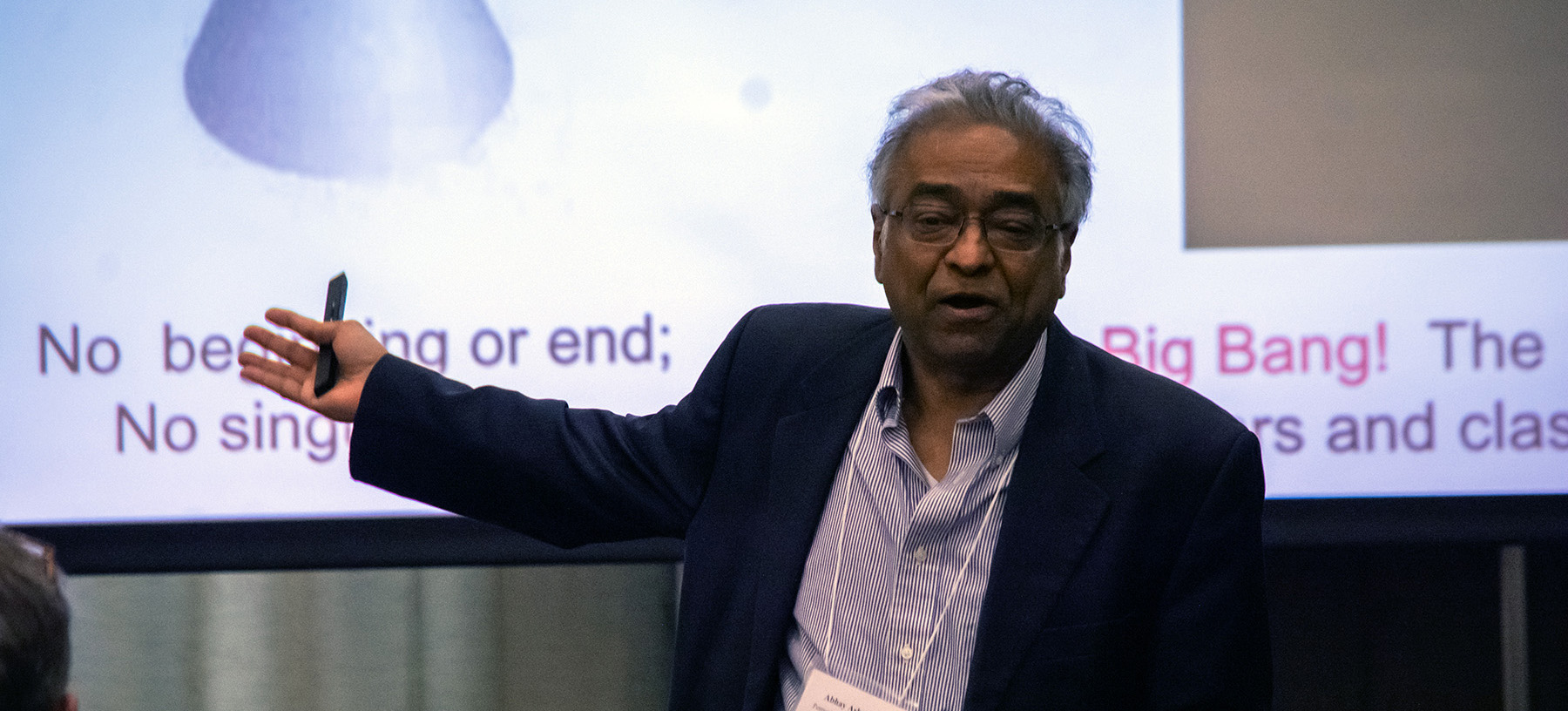2018 Kaufman Symposium RecapResearcher event was held Oct. 26-27 in Pittsburgh

Keynote speaker Abhay Ashtekar, Ph.D., opens the 2018 Kaufman Symposium held on Oct. 26-27 in Pittsburgh.
On Oct. 26-27, 2018, the Charles E. Kaufman Foundation symposium was held, bringing researchers together who received a grant from the organization (2015-2017) to present their innovative, interdisciplinary initiatives in biology, chemistry and physics. The symposium presented a unique opportunity for researchers of various disciplines to meet, share ideas and learn of current and budding collaborations across scientific fields. In addition to Kaufman-funded researchers, the symposium was attended by members of the Scientific Advisory Board, members of the board of directors and staff of The Pittsburgh Foundation.
There were 21 presentations at this year's symposium, seven from each year. Grant recipients from 2018 were also in attendance. Abhay Ashtekar, Ph.D. (biography below), a world-renowned theoretical physicist and member of the National Academy of Sciences from Pennsylvania State University, delivered the keynote speech.
Grantee Presentations at the Symposium
Dr. Elias Aizenman
2016 New Initiative Grantee, University of Pittsburgh
Genetic Programming of a Neuroprotective Pathway in Neurodegeneration
Dr. Tia-Lynn Ashman
2017 New Initiative Grantee, University of Pittsburgh
The Pollen Virome: Viral Discovery and Diversity
Dr. Philip Bevilacqua
2016 New Initiative Grantee, Pennsylvania State University
Identification of Novel RNA Switch Biology Using RNA Structure-Seq
Dr. Roberto Bonasio
2016 New Initiative Grantee, Pennsylvania State University
Single-Cell Dissection of Brain Plasticity in a Model Ant Species
Dr. Dawn Carone
2017 New Investigator Grantee, Swarthmore College
Sequence Diversity and Misregulation of Pericentric Satellite Sequences
Dr. Mark Chen
2015 New Investigator Grantee, Lehigh University
Concise Synthesis of Open-Shell-Conjugated Molecules that Exhibit Unusual Intermolecular Covalent-Bonding Interactions
Dr. Theodore Corcovilos
2015 New Investigator Grantee, Duquesne University
Building Quasicrystal Analogs with Ultracold Atoms
Dr. Gurudev Dutt
2016 New Initiative Grantee, University of Pittsburgh
Trapped Diamond Nanocrystals as Fundamental Probes of Quantum Mechanics and Gravity
Dr. Matthew Good
2015 New Investigator Grantee, University of Pennsylvania
Spatiotemporal Patterning of Zygotic Genome Activation in a Model Vertebrate Embryo
Dr. Ekaterina Grishchuk
2017 New Initiative Grantee, University of Pennsylvania
Reconstitution and Dissection of Chromosome Segregation
Dr. Chad Hanna
2016 New Investigator Grantee, Pennsylvania State University
Reducing Selection Bias in LIGO Searches for Black Holes and Neutron Stars
Dr. Michael Hatridge
2017 New Initiative Grantee, University of Pittsburgh
Engineering Quantum Machines via Parametric Couplings
Dr. Elizabeth Heller
2016 New Investigator Grantee, University of Pennsylvania
Neuroepigenetic Remodeling in Transcription and Behavior
Dr. Benjamin Hunt
2016 New Investigator Grantee, Carnegie Mellon University
Proximity Effects and Topological Edge States in van der Waals Heterostructures
Dr. Eric Joyce
2017 New Investigator Grantee, University of Pennsylvania
Condensin II-Regulated Inter-Chromosomal Contact Frequencies Can Modulate Potential to Form Translocations
Dr. Justin Khoury
2015 New Initiative Grantee, University of Pennsylvania
Superfluid Dark Matter
Dr. Brooke McCartney
2015 New Initiative Grantee, Carnegie Mellon University
Microbiota-Dependent Elevation of Alcohol Dehydrogenase in Drosophila is Associated with Changes in Alcohol-Induced Hyperactivity and Alcohol Preference
Dr. Scott Medina
2017 New Initiative Grantee (Dr. James Marden), Pennsylvania State University
Defining the Glycan-Specificity and Mechanisms of Action for Antitumor Lectins
Dr. Amish Patel
2015 New Investigator Grantee, University of Pennsylvania
How to Antifreeze Proteins Recognize and Bind Ice in Vast Excess of Water
Dr. Mikael Rechtsman
2017 New Investigator Grantee, Pennsylvania State University
Introduction to Topological Photonics and 4D Quantum Hall Physics
Dr. Jennifer Round
2015 New Investigator Grantee, Ursinus College
Identification of MAGUK Scaffold Proteins as Intracellular Binding Partners of the Synaptic Adhesion Protein Slitrk2
About the Keynote Speaker: Abhay Ashtekar, Ph.D.
Abhay Ashtekar, Ph.D., is the director of the Institute for Gravitation and the Cosmos, Evan Pugh Professor of Physics and holder of the Eberly Chair at Penn State. He received his doctorate in physics from the University of Chicago in 1978. He has authored or co-authored over 270 scientific papers and written or (co-) edited nine scientific books on general relativity, cosmology and quantum gravity. His research has advanced our understanding of the asymptotic structure of space-time, gravitational waves in full non-linear general relativity, 'atomic' structure of space-time geometry at the Planck scale and the quantum nature of black holes and big bang. His reformulation of general relativity as a gauge theory has led to loop quantum gravity, an approach to the unification of general relativity and quantum physics that is now being pursued in dozens of research groups worldwide. He has continued to play a critical role in the development of this field as well as its sub-field called loop quantum cosmology.
Ashtekar is a member of the U.S. National Academy of Sciences and a winner of the Einstein Prize of the American Physical Society, given biannually for outstanding contributions to gravitational science. He is also one of only 51 honorary fellows of the Indian Academy of Sciences, drawn from the community of scientists living outside of India. He was awarded the senior Forschungspreis by the Alexander von Humboldt Foundation and held the Krammers visiting chair in Theoretical Physics at the University of Utrecht, Netherlands; a Senior Visiting Fellowship of the British Science and Engineering Research Council; and the Sir C. V. Raman Chair of the Indian Academy of Science. He was awarded Doctor Rerum Naturalium Honoris Causa by the Friedrich-Schiller Universitaet, Jena, Germany in 2005 and by the Universite' de Aix-Marseille II, France in 2010. He is a past president of the International Society for General Relativity and Gravitation, and a past chair of the Division of Gravitational Physics of the American Physical Society.
